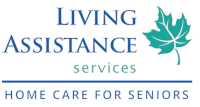According to the Government of Canada, fraud is the number one crime against older Canadians. Seniors are targeted because they’re often home during the day, tend to be more trusting, and often don’t have friends or family nearby who they can go to for advice when someone calls or comes to the door.
Even though telemarketing and other types of scams make the news daily, many seniors still don’t know what to do if a scammer calls or turns up at their door. One of our clients experienced this very thing recently. Thanks to the quick thinking and actions of their caregiver, the scam failed, saving our client a very large amount of money that would otherwise have been lost.
Peace of mind when you hire an in-home care provider
A professional in-home care provider wears many hats, including driver, housekeeper, cook, and trusted companion. You can add gatekeeper to the list and no one gets past the gatekeeper!
Our client’s experience showed us once again how valuable in-home care services can be for seniors who want to remain in the comfort of home and maintain their independence. Even the savviest of people can fall prey to a con artist.
An in-home caregiver is there to assist with the practicalities, such as activities of daily living, home healthcare, and more. What many don’t realize is that a professional caregiver is always on the alert when it comes to protecting their client. They are trained to spot changes in behavior and anything out of the ordinary in order to be able to act quickly in the best interest of their client.
Hiring in-home care services doesn’t just take some of the caregiving responsibilities off the family’s plate, but also provides peace of mind. Your loved one has someone there to look after them when you’re not able to. Our client and their family are grateful for the quick thinking of the caregiver and so are we.
Tips to help prevent senior fraud
Having someone check-in regularly, such as a family member or elderly care provider can help a senior avoid being scammed. Here are a few other tips that can help:
- Never give out your credit card, bank account, or any other personal information to someone over the phone, the internet, or at your door unless you are sure you know the person or organization you’re dealing with.
- Never tell anyone your PIN or account passwords.
- Ask for input or advice from a family member before making a purchase or ordering anything.
- Be suspicious if anyone you don’t know asks you to send them money, even if they insist it’s an emergency or their story seems plausible.
Many seniors don’t report fraud due to embarrassment, but all fraud should be reported even if the amount of money is small. Report fraud to your local police department or call PhoneBusters at 1-888-495-8501.
David Porter, CPCA
Director
Living Assistance Services – Senior Home Care
Article Resources:
What every older Canadian should know about: Fraud and scams. Government Canada. https://www.canada.ca/en/employment-social-development/corporate/seniors/forum/fraud-scams.html

